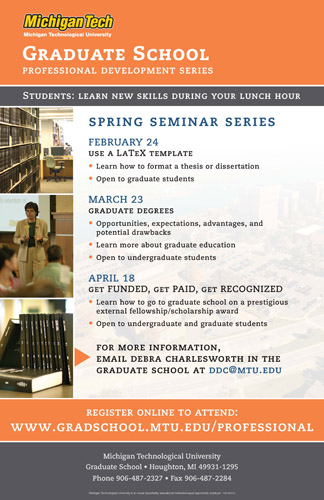There was a small doings with large implications at Career Services Monday.
Bechtel Corp., a long-time recruiter of Tech graduates, stepped forward to sponsor an interview room: the first corporation to do so and the first of what Career Services hopes will amount to 19 others doing the same thing.
A gift of $10,000 earned the company on-demand use, for two years, of a prominent, personalized room to interview students for jobs.
Monday’s gathering was a salute to Bechtel for its close ties to Michigan Tech. The ceremony coincided with the firm’s visit to campus for today’s Career Fair.
Their interview space will be put to good use. A Bechtel official said the firm has hired about 60 Tech graduates over the last five or six years.
Jim Turnquist, director of Career Services, said that Bechtel’s interest in hiring Tech graduates matches other companies’ interest: solid academics, hands-on experience in internships and co-ops, a solid work ethic, and an ability to work in teams—all hallmarks of a Tech education.
Anthony Santi, who graduated with a BS in Mechanical Engineering in 2009 and a Master of Business Administration in 2011, now works for Bechtel. A native of Kingsford, he was on hand at the ceremony and says of his education. “I couldn’t be happier. This place is tough, but definitely worth it. You get that extra step. It prepares you exactly for what happens at work.” He said he especially learned time management and teamwork at Tech as he juggled work, classes, football and the Senior Design Program.
Bechtel’s interview room will be called the Bechtel Directors Suite. Julie Way, assistant director for Career Development Education, guides the initiative to have companies sponsor interview rooms. As well, she oversees efforts to coach students how to conduct an effective interview, write a resume, learn dining etiquette and more.
The funds raised will support more programs to help students get jobs. That effort begins with first-year students, Way said. “The sooner the better.”
Internships and co-ops, she added, are “the diamond on a resume,” and companies hire students for part-time employment in these programs as soon as the beginning of their sophomore year.
She adds about Career Services: “Ultimately we’re here for the students. We pay attention to companies so they pay attention to our students. Everbody wins.” The interview rooms, she concludes, promote a company’s recognition on campus and its brand.
Turnquist said that Bechtel’s relationship with Tech “has helped our students tremendously.” He added, “They have made a difference in the lives of many students.”
President Glenn Mroz summed up the collaboration succinctly. “We thank Bechtel for continuing to be a partner with Michigan Tech in hiring our students and spreading the word that Michigan Tech is a great place to find great employees.”
Published in Tech Today
